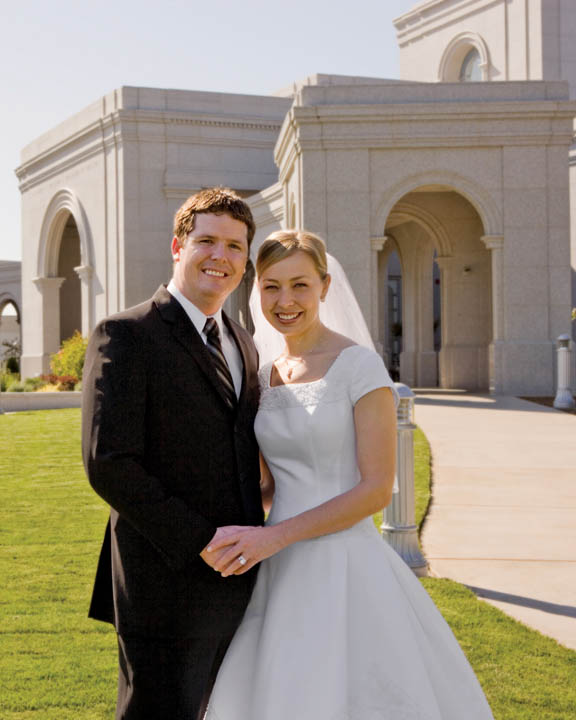Mormons Believe in Marriage Though Most of the World Hesitates: Married Couples at a
I recently read portions of a study, and a correspondent’s review, which showed the dramatic rise of co-habiting couples in the United States.
According to Carol Morello, reporting on a recent Pew Study, “The proportion of adults who are married has plunged to record lows as more people decide to live together now and wed later, reflecting decades of evolving attitudes about the role of marriage in society.” Just 51 percent of all adults who are 18 and older are married, placing them on the brink of becoming a minority, according to a Pew Research Center analysis of census statistics to be released Wednesday. That represents a steep drop from 57 percent who were married in 2000. Read more …
 Fearful of marriage or commitment, or torn from the institution as a result of the tidal wave displacing the truth about its purpose and sanctity, it’s become the predominant trend.
Fearful of marriage or commitment, or torn from the institution as a result of the tidal wave displacing the truth about its purpose and sanctity, it’s become the predominant trend.
Mormons–a nickname for members of The Church of Jesus Christ of Latter-day Saints believe in the centrality of families in God’s plan and their demise is an intentioned plan of the proponent of all evil himself–scratch, or realistically, Satan. He’s played a magic trick–worked the media into believing that the rabbit of marriage should disappear, maneuvering enough handkerchiefs around a mesmerized audience to convince them it’s all okay, and all in the name of diversity. People, hypnotized by the hype about choosing any brand of sexuality and sexual relationship as if it’s a choice between vanilla and chocolate rather than a moral choice, are hunkering down together, and fearful, perhaps of a marriage commitment. Latter-day Saints, or Mormons, are strong proponents of healthy marriages. Theirs, too, are marked by casualties of divorce, but less so than those of the world, and less so than all of those who co-habit and then marry. Co-habitors who marry actually increase their likelihood of divorce rather than reduce it. Not a surprise. The Lord’s plan is the right one.
Mormons’ believe in abstinence before marriage and fidelity in marriage. They invite God literally into their relationship as they kneel across a beautiful altar in a dedicated House of the Lord–or Mormon temple–and covenant or promise to each other and to God an acceptance of His laws and of one another before witnesses who record the event on earth and heaven. Mormon marriage is intended to be eternal, conditioned upon the kept covenants of each participating spouse. God has a perfect plan in place for imperfect people. He offers His grace, power, blessing, Hand on a marriage where couples promise and strive, however imperfectly, to live His laws which bring the greatest happiness and peace, through thick and thin, through easy times and rough roads of mortality. Marriage is intended to be a place where mercy and love are learned, where individuals are tested and the opportunity exists to love as Christ loves–unconditionally, sacrificially, openly, vulnerably–and to progress in the path to eternal life together. Mormons believe in more than a death-do-you-part marriage; again, marriage, and Mormon marriage–those performed in holy temples of God (Mormon temples) are meant to be eternal.
Mormon Beliefs: Chastity
It’s true that the dominant evil in the world today is unchastity. President Joseph F. Smith chose these words to be written above his signature while he was living:
No more loathsome cancer disfigures the body and soul of society today than the frightful affliction of sexual sin. It vitiates the very fountains of He who is unchaste in young manhood is untrue to a trust given to him by the parents of the girl, and she who is unchaste in maidenhood is untrue to her future husband, and lays the foundation of unhappiness in the home, suspicion, and discord. Do not worry about these teachers who say something about inhibitions. Just keep in mind this eternal truth that chastity is a virtue to be prized as one of life’s noblest achievements. It contributes to the virility of manhood. It is the crowning virtue of womanhood, and every red-blooded man knows that is true. It is a chief contributing factor to a happy home; it is the source of strength and perpetuity of the nation.
David O. McKay, late apostle of Jesus Christ (Latter-day Saint or “Mormon”), shared, through literature, as he addressed a young single adult audience, that there “is no loss of prestige in maintaining in a dignified way one’s standards.”
maintaining in a dignified way one’s standards.”
He stated: I thought of a great illustration in literature wherein a Jewish maiden won the respect even of a profligate.
Read the story of Rebecca, that beautiful character in Sir Walter Scott’s “Ivanhoe,” who was the prisoner of Brian de Bois-Guilbert. He had chosen her for base reasons. Others of his crowd chose the old father to rob him of his wealth. When Brian de Bois-Guilbert came in to take charge of his prize, Rebecca “had already unclasped two costly bracelets and a collar, which she hastened to proffer to the supposed outlaw, concluding naturally to gratify his avarice was to bespeak his favor.” “Take these,” she said, “and be merciful to me and my aged father! These ornaments are of value, yet they are trifling to what he would bestow, to obtain our dismissal from this castle, free and uninjured.”
“Fair flower,” replied the outlaw, “These pearls are orient, but they yield in whiteness to your teeth; the diamonds are brilliant, but they cannot match your eyes; and ever since I have taken up this wild trade, I have made a vow to prefer beauty to wealth.”
“Thou art no outlaw,” said Rebecca; “No outlaw had refused such offers. . . Thou art a Norman—a Norman, noble perhaps in birth—Oh be so in thy actions, and cast off this fearful masque of outrage and violence!”
“I am not an outlaw, then, fair rose of Sharon. And I am one who will be more prompt to hang thy neck and arms with pearls and diamonds, which so well become them, than to deprive thee of these ornaments.”
“What would’st thou have of me,” said Rebecca, “if not my wealth?—We can have nought in common between us—you are a Christian—I am a Jewess—our union were contrary to the laws alike of the church and the synagogue.”
“It were so, indeed,” replied Brian de Bois-Guilbert, laughing: “wed with a Jewess?—not if she were the Queen of Sheba!”
And then Rebecca knew his purpose. She threw open the latticed window, and an instant later stood on the verge of the parapet, with not the slightest screen between her and the tremendous depth below, and exclaimed: “Remain where thou art, proud Templar, or at thy choice, advance!—one foot nearer, and I plunge myself from the precipice; my body shall be crushed out of the very form of humanity upon the stones of that court-yard, ere it become the victim of thy brutality!”
As she spoke this, she clasped her hands and extended them towards Heaven, as if imploring mercy on her soul before she made the final plunge. The Templar hesitated, and a resolution which had never yielded to pity or disgrace, gave way to his admiration of her fortitude. “Come down,” he said, “Rash girl—I swear by earth, and sea, and sky, I will offer thee no offence.”
And the reprobate for the first time in his life was taught respect for womanhood.
You can be in this world and “not of the world.” Keep your chastity above everything else.
Source:
David O. McKay, Stepping Stones to an Abundant Life, Deseret Book, pp 11-13.
